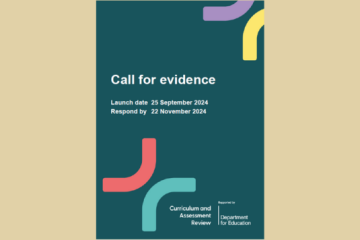Curriculum and Assessment Review - ASE submission

The ASE welcomes the opportunity to respond to the Curriculum and Assessment Reviews’ call for evidence. Our response draws on a compelling research evidence base, including from ASE and often in partnership, and on the expertise and experience of our ASE membership. We’d like to express our thanks to all our members who contributed to our survey and focus groups, and to the following ASE groups which have contributed to our response: ASE’s Primary Science Education Committee, Science Education 11-19 committee, Education Group, Policy Group and Research Group.
Additionally, we’d like to thank Louise Archer, Rob Butler, Sarah Earle, Alastair Gittner, Sally Howard, Alistair Moore, Jonathan Osborne, David Shakespeare and Charles Tracy for their contributions in shaping ASE’s response.
Our response
Our response outlines the longstanding challenges to the current curriculum and assessment to be addressed. In brief, the curriculum is content heavy, outdated in places, prioritises rote memorisation over critical thinking, problem solving and practical skills and discourages cross-disciplinary exploration. This is compounded by an overreliance on testing for external accountability at key stage 4 (GCSE level) and post 16 (A levels and equivalents), which fosters a culture of ‘teach to the test’ where educators prioritise exam technique over deep understanding and application of knowledge. This approach can exacerbate inequities in educational outcomes and stifle creativity and innovation.
On equity and inclusion, there are often disparities in science education and attainment among different schools and communities. Evidence shows a correlation between socio-economic disadvantage and less engagement and attainment in STEM subjects. Low socio-economic status is also associated with less well-equipped laboratories and digital resources, and lower availability of well qualified science teachers. This can result in certain groups of students being left behind in, leading to social and economic disparities in STEM fields.
ASE makes recommendations to address these challenges which include:
- The curriculum is developed from the science principles underpinning the science education of all young people, through the big ideas of and about science, to enable them to understand the scientific aspects of the world around them and make informed decisions about the applications of science. The structure of the underpinning science curriculum framework is modern, forward facing and develops students’ broader competencies including agency as informed, active citizens and competent contributors to STEM economy.
- Primary science is given equal status, and appropriate curriculum time, to the other core subjects. Teacher assessment, when supported to do well, can be provide valid summaries of children’s attainment, together with supporting teacher practice and formative use of assessment to support children’s learning. As a core subject, science attainment should continue to be reported at the end of KS1&2, but teachers need more support in order to make and use judgements in primary science.
- Across all phases, greater clarity and coherence are given when working with mathematical ideas, language and procedures in science and mathematics lessons, to help children transfer their mathematical skills and understanding effectively to their science learning. Responding to the proliferation of data and misinformation, students experience of mathematics in science (and other subjects) from KS4 needs to broaden their digital and statistical literacy.
- The curriculum allows more time for high-quality practical work which is guided, active and purposeful, provides opportunities for investigations, and supports development of technical and manipulative skills, and transferable creative skills. The curriculum must make clear how practical activities are situated within clearly-mapped and coherent progression pathways for skills development and learning through the 5 years of the secondary school science curriculum. Summative assessment arrangements must change to better incentivise effective practical work.
- An exploration of varied forms of assessment, including appropriate digital assessment, and teacher assessment, without negatively impacting on teacher workloads.
- The introduction of a single, unified science route for all GCSE students, which incorporates the benefits of the current Triple science pathway but without overwhelming students or narrowing the curriculum. The dual science route at GCSE (Double / Triple science) hinders progression and exacerbates/ sustains social inequalities, with research suggesting that those who take Triple science are more likely to pursue the study of science post-16, whilst for those taking Double science the likelihood of future participation in science is significantly diminished.
You can read our full response to the set of questions which were appropriate to science education here.
The ASE looks forward to continuing to engage with the review process and relevant stakeholder groups.
